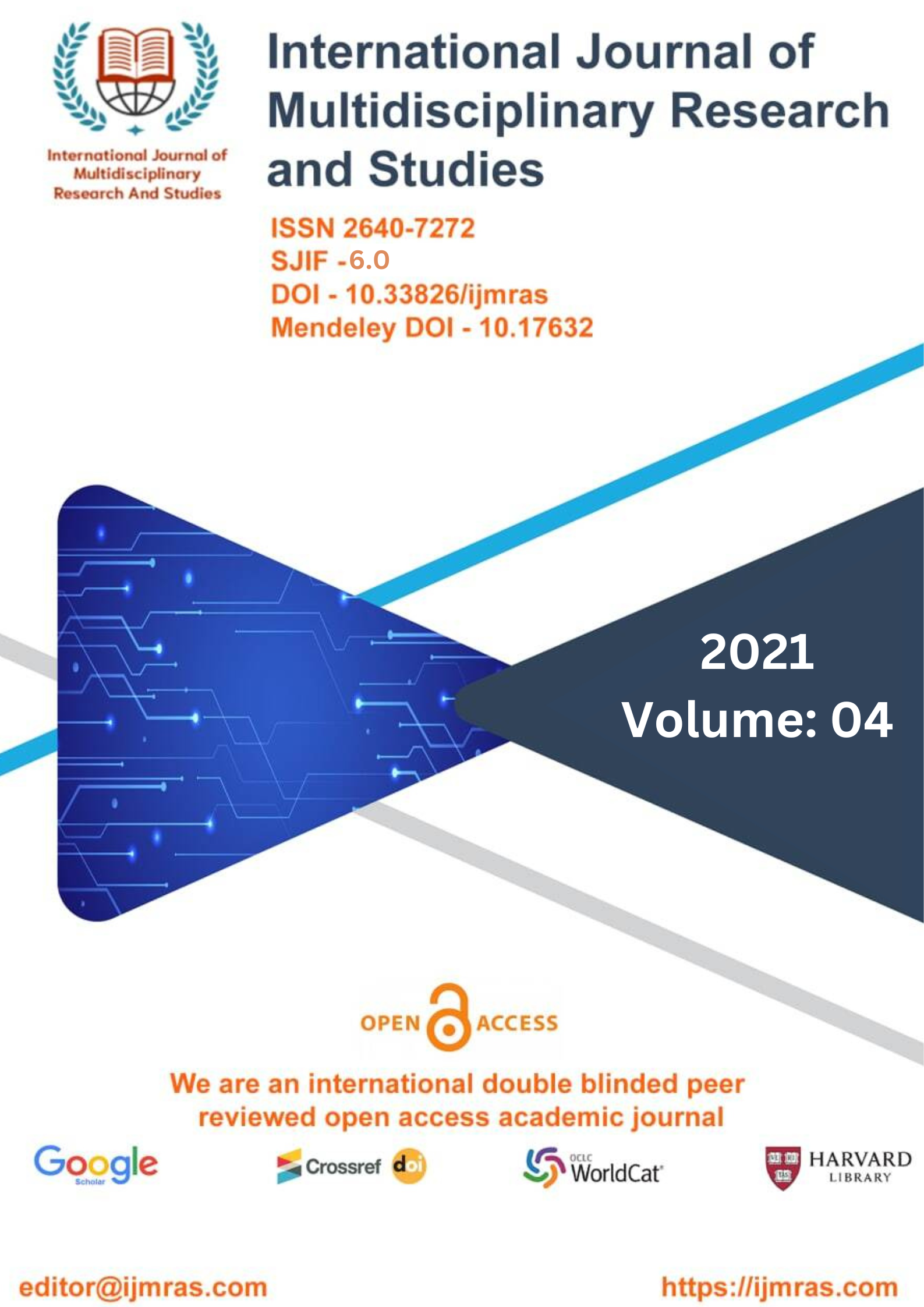Rohinton Mistry’s Diaspora

Abstract
The study of the literature and other cultural works that pertain to the Indian diaspora is the primary focus of the book "Literature of the Indian Diasporic." In addition to that, it is a significant contribution to the field of diaspora theory in general. This anthology applies a theoretical framework based on trauma, mourning impossible, spectres, identity, travel, translation, and recognition, and uses the term "migrant identity" to refer to any ethnic enclave within a nation-state that defines itself, consciously or unconsciously, as a group that is in displacement.
Keywords
Literature, mourning impossible, spectresHow to Cite
References
New Delhi: Surup and Sons, 2005. 220-37 Bhalla, Alok. Partition Dialoges. New Delhi: Oxford. 2006. Bhatnagar, Manmohan, K.
"Indian English Literature- Its Rationale and A Critical Introduction." Indian Writing in English. Ed. M.K. Bhatnagar. Vol. 1. New Delhi: Atlantic Publisher, 2001. 1-11.9 vols.
Alternate Realities - A Note on Indian English Literature." Indian Writing in English. Ed. M.K. Bhatnagar. Vol. 5.
New Delhi: Atlantic Publisher. 1999. 1-3. 9 vols. —. "Appraising Indian English Literature
Indian English Literature—A Perspective." Indian Writing in English. Ed. M.K. Bhatnagar. Vol. 2. New Delhi: Atlantic Publisher, 2001. 1-17. 9 vols. —. "
Indian English Literature—^A Stock Taking." Indian Writing in English. Ed. M.K. Bhatnagar. Vol. 4. New Delhi: Atlantic Publisher, 1999. 1-13. 9 vols. —.
"Multiculturality and Indian (English) Literature." Indian Writing in English. Ed. M.K. Bhatnagar and M. Rajeshwar. Vol. 9. New Delhi: Atlantic Publisher, 2000. 5-13.9 vols.
"The 'Complex Fate' of Indian English Literature." Indian Writing in English. Ed. M.K. Bhatnagar and M. Rajeshwar. Vol. 9. New Delhi:
Brecher, Michael. Succession in India: A study in decision-making. Bombay: OUP. 1966. Chakrabarti, Merivirta.
"Reclaiming India's History - Myth, Histor>' and Historiography in Shashi Tharoor's The Great Indian Novel." 09 Sep 2007. 10 Jul 2011.
Chandra, Bipan. India Since Independence. New Delhi: Penguin. 2008. Chandra, Bipan. India's Struggle for Independence. New Delhi: Penguin. 1987. Chandra, Bipan. Modern India. New Delhi: NCERT. 1971.
Chaudhary, Sourin. How India won Freedom. New Delhi: S. Chand and Co. 1987. De, Shobha.
The Shobha De Omnibus. New Delhi: Viking, 1995. Dhir, Paras. "Shashi Tharoor's Riot: Perspectives on History, Politics and Culture" Rupkatha Journal on Interdisciplinary Studies in Humanities Summer Issue, Volume I, Number 1, 2009. Dodiya, Jaidip Singh. "
The Changing Trends in Indian Writing in English with Special reference to Shobha De." Indian writing in English Perspectives. Ed. Joya Chakravarty. New Delhi, 2003. 83-86. Fowler, Roger. "
Polyphony in Hard Times." Language, Discourse and Literature: An Introductory Reader in Discourse Stylistics. Ed. Ronald Carter and Paul Simpson. London: Unwin Hyman, 1989.
Gandhi, Lingaraja. "An Interview with Dr. Mulk Raj Anand." Indian English Literature. Ed. Basavaraj Naikar. Vol. 7. New Delhi: Atlantic Publishers, 2007.
Ganti, Tejaswini. BollywoodA Guide to Popular Hindi Cinma. New York and London: Routledge Taylor and francis Group, 2004. Godbole, Madhav.
The Holocaust of Indian Partition: An Inquest. New Delhi: Rupa. 2006. Kaufman, Glenn J. "Divya Dham: A Temple in Transition" 26 Apr 2006. 10 May 2011 Khan, Mohamed Raza. What Price Freedom.
Madras: Nuri. 1969. Kotnala, Sanjeev. "RIOT by SHASHI TH.ROOR" 4 Apr 2011. 10 May 2011 168 Kumar, Nanda.
License
Copyright (c) 2021 Manisha

This work is licensed under a Creative Commons Attribution 4.0 International License.
Individual articles are published Open Access under the Creative Commons Licence: CC-BY 4.0.




